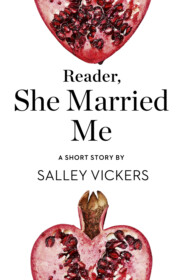По всем вопросам обращайтесь на: info@litportal.ru
(©) 2003-2024.
✖
Instances of the Number 3
Автор
Год написания книги
2018
Настройки чтения
Размер шрифта
Высота строк
Поля
‘Who cares?’ Bridget was soberer now.
‘What would Peter think?’ Frances asked as a while later together they made the bed upstairs.
Bridget reflected a moment. Outside, through the west-facing window, the far hills were turning indigo—‘blue remembered’, she thought, like Housman’s.
‘He’d have been sorry not to be joining us,’ she finally announced.
It was not that Bridget had failed to hear Frances’s question about Zahin but that she had decided to ignore it. She hadn’t yet assembled her impressions of the boy. Christmas had been…she needed time to ponder…
Except in the first years of their marriage, Christmas with Peter had never been a tranquil event. Bridget’s consciousness of a regular Christmas Eve assignation, long before she met the object of it, caused her bridled indignation. To say she was without ill feelings towards Peter’s other ‘associations’—as it was her habit to call them—would have been stretching a point. Possibly there are people large-hearted enough to offer perfect charity towards those with whom they are asked to share the person of their beloved; but purity must be its own reward: while commendable it is hardly interesting, and anyhow Bridget was not among this angelic band. On the other hand, she had learned the dangers of bearing grudges.
Bridget had been born and bred in Limerick, in the south-west of Ireland. Her father had been tricked by a phantom pregnancy into an ill-matched wedding. When, in time, a child was eventually born, she received the brunt of a resentment which had had five years in which to accrue. Among families, resentment is often expressed indirectly. To Joseph Dwyer’s fear of his wife was added an even greater fear of her brother, Father Eamonn, priest to the neighbouring parish and spoken of as ‘episcopal’—even ‘cardinal’—material. Unhappily for Bridget, her father kept his interior rage for the family who had curtailed his snappy-bachelor freedom, while he vented it more openly upon his daughter.
Bridget was born curious. She questioned her mother, her grandparents—who lived a village away—her uncle the priest, her teachers—most of all she questioned her father, to the point where her mother finally abetted her daughter’s flight from home, lest, as Moira Dwyer confessed to her brother, ‘there be a murder in the house’.
That there was not a murder was due to Bridget’s early discovery that life tends to be unyielding to our desires. She was unusual in perceiving so soon the gap between what we want and what is possible; more remarkable still, in time she came to recognise the distinction between what she felt was her due and what was actually on offer—a distinction which stood her in good stead when, years later, on Christmas mornings, having returned late from Turnham Green, her husband would say, in varying accents of agitation, ‘I’m sure I did buy you something—no, hang on, I know I did—let me think a moment while I remember where I put it…’ or ‘Good God, have I left it behind in the shop…?’
All this might have been easier to accommodate had not Bridget, not meaning to pry, once come across a small box, which curiosity had made her open and which had shockingly revealed a costly looking square-cut sapphire ring, a particularly brilliant blue. It was, in fact, the sight of this ring on Frances’s finger, which had sparked the moment of tension over the Christmas bowl. Seeing it, Bridget had felt a return of the nauseous rush of jealousy which had accompanied the original discovery of the ring in its expensive leather hiding place.
Christmas with Zahin could hardly have been more different. He had arrived, with his things from St John’s Wood, late in the day on Christmas Eve. How in that short space of time he had managed so to infer her tastes and buy accordingly, Bridget could never fathom. She had popped out and bought him a rather dull shirt, feeling that to do more on such a short acquaintance would be overdoing it. But no such reserve had apparently constrained Zahin.
Bridget had woken on Christmas morning to find a pile of glitteringly wrapped gifts at the foot of her bed. Wonder vying with a sense of slight fear—caused by the appearance of something at once so long desired and so unexpected—she had gathered up the colourful, gleaming parcels and returned, like a child, with them to bed. Here she undid swathes of tissue paper with the astonishment of one schooled in deprivation. Silk scarves, silver bangles, a stole, scent, a gilt peacock, a leather-bound diary, a pair of velvet slippers—it was like produce from some fabulous dream, or bazaar in the Arabian Nights.
Downstairs in her kitchen she found Zahin had also been at work. The table was laid with a length of some old lace he must have found in the linen cupboard and adorned with scarlet poinsettias, pink azaleas, golden roses. The smell of superior coffee mingled with the scent of roses to perfume the room, like incense from some exotic temple.
‘Zahin?’
‘O Mrs Hansome,’ the boy had cried. ‘How pretty you look! It suits you—look how it suits your colouring!’
Bridget, who had strung the scarves round her neck and wound the stole round her shoulders, glanced over to where he had gestured towards the long glass which hung by the kitchen door. It was a glass which Peter had used to scrutinise his carefully accoutred frame, before meeting the world.
Handsome is as handsome does—her own mocking words came back to her,
‘Zahin—I am overwhelmed. There was no need for all this.’
‘But I like to.’ The boy spoke with an odd note of authority. ‘Now, I make you coffee, and toast. You like jam, honey? See, I have also made pancakes.’
Bridget had not noticed the sapphire ring again until Frances took it off and placed it in a saucer beside the bed at Farings before visiting the bathroom. Bridget waited until Frances had left the bedroom and then examined the ring under the bedside light. No doubt about it—it was the same. She considered stealing it and then denying all knowledge. But what would she do then—throw it away? She could hardly wear it herself! Or she could raise the matter with Frances and they could have a tremendous row. That might be satisfying but in the end she felt she couldn’t be bothered.
‘Turn out the light when you’re ready,’ she said when Frances came back, steamy, from the bathroom, and surprisingly middle-aged in a washed-out candlewick dressing gown. ‘I’ve put a bolster between us in case one of us kicks.’
‘I don’t kick.’ Frances was not looking forward to a night spent with Bridget.
‘Well, I can.’
Peter had said so. But Bridget kept this from Frances. Turning her back to her bed companion, she had a sudden flash of Peter’s face, should he see them there—his mistress and his wife—tucked up together in his bed.
That night Peter Hansome did indeed come to the room where the two women lay side by side in the bed which had once been his. For some while he remained looking down at their sleeping forms. Then, when a cock crowed, and the green dawn light began to seep through the curtains, he vanished back whence he had come.
9 (#ulink_3f647db6-a5a8-5d68-9135-c38a52dbd923)
Frances had wondered whether it was wise to wear the sapphire ring to Farings. Apart from other considerations it hardly seemed polite. But she was also apprehensive, staying in Bridget’s house, and glimpses of the blue square offered little oases of reassurance.
Peter had given Frances the sapphire the Christmas after Paris. Opening the compact leather box she had exclaimed, ‘Notre-Dame blue!’ which made Peter, who had worried, pleased he had bought it after all.
It might have surprised Bridget to learn that her husband was aware that, in matters such as this, he might be said to favour his mistress over his wife. Yet, essentially, he was not an unfair man.
No one has ever fully explained why humankind so resists a sense of requirement. Perhaps it is this very propensity which constitutes what it means to be ‘human’—certainly it seems to have been at the bottom of the debacle in the Garden of Eden, or so the story goes. In Peter Hansome’s case the tendency expressed itself towards Bridget because she was his wife: within the convention he was reared to she came with perceived obligations. He did not allow his inability to be demonstrative when it was expected of him to trouble him much of the time; but times of celebration, especially Christmas, had the effect of exposing a moral nerve.
Peter would not normally have risked his conscience so far by making such a one-sided gesture as the gift of the sapphire ring. It was the extraordinary colour of the stone which had drawn him—that ethereal blue—the colour of Paris. Perhaps—he didn’t know—it was the colour of his soul? If he had a soul…
Neither woman knew this but Peter’s hatred of Christmas began when his father had deserted his family on Christmas Eve. His mother had made the best of things—but ‘the best of things’, even when executed with genuine selflessness, often turns out to be worse than selfish protest.
From an early age Peter had monitored his mother’s face. That Christmas, undeceived by a not-too-convincing story about ‘Daddy’s business’ calling him away, Peter had watched his mother’s expressions more closely than usual. There had been a horrible moment between the turkey and the Christmas cake—decorated that year with a superfluity of snowmen and hard little silver balls, which Peter afterwards always hated—when he had sleuthed his mother to her bedroom and, through the keyhole, had spied her lying on the bed, her face pressed into a pillow to stifle any sound.
Six-year-old Peter had been tactful enough to remove his presence from this private grief, and to hurl himself, with unusual energy, into a distractingly boisterous game with his elder brother, Marcus. He had also been unusually conciliatory with his little sister, Clare, and had played doll’s-house tea with unwonted sweetness which had raised—unfairly in the circumstances—maternal questions later about his state of health.
There had been other, happier, Christmases when his mother’s smiles had been less forced, and, later still, his mother’s smiles had become genuine, for a time, when his stepfather, the MP, had first appeared on the scene. But the early loss had fractured for good the young Peter’s capacities for enjoying the ‘season of goodwill’. The pillow which had stifled the mother’s anguish acted as a more permanent block upon the son’s capacity to rejoice. From that time on Peter grew to think of Christmas, and its attendant duties, as dangerous, an ordeal rather than a blessing—one of many—to be ‘got through’.
Bridget woke in the bed she had once shared with Peter, left Frances sleeping and went barefoot downstairs to make herself a cup of tea. Outside the kitchen window a flock of goldfinches made a vivid zigzag across the pale wintry field. Bridget stretched and yawned noisily. There were advantages to living alone—Peter, who could be prim, would have grimaced at the sound. What was the collective noun for goldfinches?
She had dreamed of Peter—the first time since he had died. She couldn’t bring the dream back but she knew from the feeling in her limbs it was Peter all right.
Bridget filled a kettle and looked appraisingly round the kitchen where Frances had hung on nails bags of Italian pasta and some of the large copper French pans. The paint work wasn’t right—too shiny—but with the old brocade curtains she’d been waiting to find a use for, and a lick of distemper, the place would do up fine.
She made tea in a big mug, stirring the tea bag to give the brew strength, and stuck her bare feet into boots. Outside, she surveyed the field where the striking looking finches with their gold-flashed wings and crimson foreheads had flown. The bare soil, fringed by bleached grasses, stretched in gleaming furrows where the light struck the early-morning moisture.
Frances appeared and began opening cupboard doors. ‘There’s some coffee in that cardboard box.’ From the doorway Bridget pointed. ‘Otherwise there’s tea and some rather mouldy bread in that bag. It must be damp here.’
Maybe she could grow mushrooms? Suddenly she remembered: ‘Charm’, that was it! The term for a flock of goldfinches was a charm. ‘Why do Renaissance paintings of the Virgin have goldfinches in them?’ she asked Frances.
Frances wrinkled up her forehead. In the morning light and with her pointed nose she looked quite witchy. ‘The red spot at the top of their heads, isn’t it? The goldfinch fed from the crown of thorns and Christ’s blood anointed its head; I think that’s the story.’
Frances, who had dreamed of Peter too, was also trying to remember the dream. Had he said anything to her? There was something but it was more a mood or a flavour—like the lingering scent left by an interesting visitor.
Bridget noticed Frances was not wearing the sapphire. ‘Don’t forget your ring’s upstairs,’ she threw over her shoulder, going back out into the garden.
The two women had worked hard all day.
‘That looks better,’ Frances said, looking round the parlour with satisfaction. She had polished the wooden furniture with some beeswax which she had found under the sink, left behind by the house’s former occupants.
The doorbell startled them. ‘I’ll get it,’ and Bridget opening the door saw a man with a big slack face and high colouring. Only then did she see the collar.
‘Bill Dark,’ said the man holding out a hand. ‘Rector of St Anselm’s. Called to introduce myself.’
Bridget found a bottle of sherry in one of the boxes they had not yet unpacked and Frances kindled a fire.
‘Mrs Nettles is your nearest neighbour,’ their visitor (‘Call me “Rector Bill”’) said. ‘She’s pushing eighty but spry as anything.’ He pushed his empty glass vaguely in Bridget’s direction.











